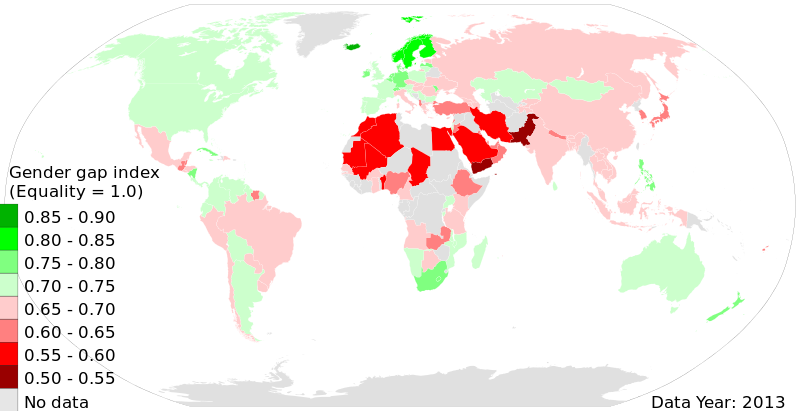Feminism for everyone
Graphic via Wikimedia Commons under Creative Commons license
World map comparing each country’s Gender Gap score from 0-1. Courtesy Wikimedia Commons.
November 20, 2014
Feminism has become a dirty word. Most recently, TIME Magazine listed “feminism” as an option for a word to ban going into the new year and a YouGov poll this July noted that 75% of Americans don’t see themselves as feminists.
In the same poll, one out of every seven people believe that being called a feminist is an insult. For some reason in America, we feel threatened when a group fights for their rights. It has to stop.
While many people see feminists as a group of male-hating, socialist women who refuse to wear bras, in fact, the very definition of feminism is simply enough “the fight for the political, economic, and social equality of the sexes.” It is clear that we have not reached that equality.
First off, only 10% of governors, 20% of senators, and 18% of representatives are women, this added to the fact that we have never had a female president. With regard to economic equality, women still only make 77 cents on the male dollar and represent a dismal 5% of Fortune 500 company CEOs.
Even worse, more than one in seven American women live in poverty. Socially, 90% of sexual assault victims were women and women face a 68% increase in healthcare costs, mostly due to the artificially high prices of birth control and women’s health procedures.
The major question then becomes why? Why has society actively fought against feminism and attacked people who are trying to fix an obvious problem? It is because we’re scared. Especially people in power (aka men) are frightened that granting equal rights to women will somehow harm them. They advocate for male rights and that, biologically and evolutionarily, men are superior. In this modern day, it is ridiculous.
But that isn’t to say that men’s issues don’t exist. In fact, feminism would be bolstered if it further recognized male issues and incorporated it into the overall message.
Men don’t usually have a say in potential paternity cases, Ray Rice was aggressively criticized while Hope Solo was ignored for committing the same crime, and sexual assault against males, while in much smaller numbers, can be even more devastating due to the intense stigma on reporting the crime.
If feminism is to be the equality of the sexes, then it must focus on issues facing both genders. It shouldn’t be #HeforShe, it should be #HeandSheforUs. If the movement takes this on, it can attract a whole new part of the population.
But I must be clear, the imperative is not on feminists. We must all fight against inequality. Just because men have issues does not mean that the problems’ magnitudes are equal.
Females face discrimination several times that of men, it just so happens that the most effective approach is to be comprehensive. Feminism can achieve all of its goals by working towards its very definition, and we must stop using it as a dirty word.








